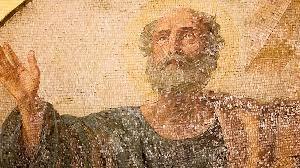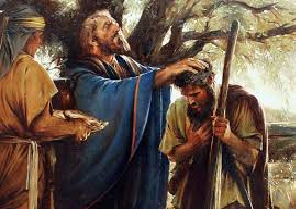Az – Priceless Treasure in Clay Jars 4: 7-15
Priceless Treasure in Clay Jars
4: 7-15
Priceless treasures in clay jars DIG: Why is the picture of a clay jar a fitting one for describing believers in relation to their Lord? What qualities should we have as clay jars for God’s use? What is the treasure within the clay jar? What truths keep Paul going in spite of his hardships? Why does ADONAI call Paul to go through such hardships?
REFLECT: What does “death at work” and “life is in you” mean to you? Which is at work in your life? Why? How do these verses help you cope with your present difficulties and anxieties? How do these verses challenge the commonly held ideas of what makes a person a “success?” Is your jar broken? What price are you willing to suffer to follow the Messiah?
The ministry that costs nothing, accomplishes nothing.
The gospel is a treasure. This treasure has been entrusted to us, men and women who are nothing more than clay jars. God did this on purpose because, given our human weaknesses, the impact of the Gospel is not evidence of human power, but of the power of ADONAI.112
When Paul wrote this letter, he was under furious attack in Corinth. False apostles (to see link click Aj – The Problem of the False Apostles) had infiltrated the church there, assaulting Paul so as to create an environment for spreading legalistic false doctrine. To gain a hearing for their demonic lies, they first had to destroy Paul’s apostolic authority and spiritual credibility in the eyes of the Corinthian Church. To that end, they launched an all-out blitz on the apostle’s character and ministry. Their attack was merciless, relentless, and petty. They even stooped so low as to criticize Paul’s personal appearance (10:10). The false apostles claimed the reason so many had rejected his message was that he was an unimpressive, common man.
Those hurtful, hateful attacks, moving people’s loyalty from divine truth to satanic lies, demanded a response from Paul. He was not necessarily interested in defending himself for his own sake, but for the sake of the Gospel. Paul knew that if the false apostles could discredit him, they could replace him as the apostles with authority in Corinth. Then, they would be free to deceive the Corinthians with their false teaching.
The false apostles’ attacks on him put Paul between a rock and a hard place. If he defended himself against their slander, which he had to do to hold the church to the truth (written and accurate), he risked looking proud. And, in truth, no one was more acutely aware of his shortcomings than Paul himself. In his first letter to the Corinthians he confessed: For I am the least of the apostles and do not even deserve to be called an apostle, because I persecuted the church of God (First Corinthians 15:9 NIV). To Timothy he wrote: I thank Christ Jesus our Lord, who has given me strength, that he considered me faithful, appointing me to His service. Even though I was once a blasphemer and a persecutor and a violent man, I was shown mercy because I acted in ignorance and unbelief (First Timothy 1:12-13 NIV).

How could Paul remove himself from such a dilemma? How was he able to defend himself and the gospel he preached without seeming proud? Rather than deny the false apostles’ accusations that he was weak and imperfect . . . Paul embraced them! The apostle declared the timeless truth of the gospel was held in a humble container. In fact, his weakness, far from being a reason to reject him, he used the analogy of a precious treasure in a clay jar. But we have this treasure in clay jars, so that it will be evident that such overwhelming power comes from God and not from us (4:7).
Clay jars were commonplace in virtually every home in the ancient Middle East. They were inexpensive and easily broken. Unlike metal jars (which could be repaired) or glass ones (which could be melted down and reused), once broken, clay jars had to be thrown away.113 Yet, rather than being housed in a gilded box, God entrusts His treasure to these fragile containers . . . ordinary and disposable. However, the very weakness of the clay jars focuses attention on God’s extraordinary power. The redeemed of Messiah might not look too outwardly impressive at times (10:10), but inside we each contain the light and treasure of God.
The simile of the clay jars takes us back to the incident during the time of Gideon. In Judges 7 we read that Gideon took only three hundred men with him to free their land of innumerable Midianite invaders. Each man had a trumpet and a torch and an empty clay jar. They carried their torches in the clay jars so that the light couldn’t be seen from a distance. Then when they got among the Midianites, they broke their clay jars. It wasn’t until the clay jars were broken that the light could shine out. That is the thing which we need today. We need our jar to be broken. The apostle Paul was a man who knew what it was to be broken for Yeshua’s sake. With the “health-and-wealth” gospel that is so prevalent today, the trouble is that we don’t have enough who are willing to do that.114
Expanding upon his clay jar theme, Paul wrote one of his most transparent statements. Although Paul was a fragile clay pot of inferior quality, he was not broken. To illustrate this, he rehearses a list of hardships that he had endured as an apostle of Messiah. We have all kinds of troubles, but we are not crushed; we are perplexed, yet not in despair; persecuted, yet not abandoned; knocked down, yet not destroyed (4:8-9). On first reading, it may appear that the list presents Paul in stoic-like terms as someone who bravely endures the sufferings that his ministry brought. However, his statement: so that it will be evident that such overwhelming power comes from God and not from us (4:7), clearly indicates that his purpose is to show that his hardships paradoxically display the power of God.115
Most people of average devotion would have been broken by such adversity. Yet devotion did not sustain Paul; it was the power of God at work within Him. The task demanded all he could give. And when he had given his all, and even that wasn’t enough, God’s power carried him through. This truth prevented him from thinking that he could do it all by himself. He knew that God was working even through his limitations and failures. As one controlled by the love of Messiah, he dared to reach beyond his limits because he trusted in God’s power to redeem what he did. Paul had become the suffering apostle of the suffering Messiah.116
In contrast to the false apostles in Corinth, Paul could say that he may have been knocked down, so to speak, but he wasn’t knocked out. The false apostles did not suffer. Instead of winning lost souls, they stole converts from Paul’s churches. Instead of sacrificing for the people, they made the people sacrifice for them (11:20). The false apostles did not have treasure to share. All they had were some museum pieces from the TaNaKh, faded antiques without the life-giving Ruach Ha’Kosesh.117
The suffering that Paul and his companions were experiencing was merely a continuation of the suffering endured by Yeshua. We always carry in our bodies the dying of Yeshua, so that the life of Yeshua may be manifested in our bodies too (4:10). The word dying here does not translate thanatos, Paul’s usual word for death, but nekrosis. Thanatos speaks of death as a fact or a one-time event, while nekrosis describes the process of dying. It was not a matter of life after death or even life through death, but of death in the midst of life. What had been done to Messiah – the false accusations, the beatings, the mockery, His murder – was exactly what was being done to them. In that context, they felt privileged to suffer on their Lord’s behalf. As Paul wrote to the church in Colossae: Now I rejoice in what was suffered for you, and I fill up my flesh what is still lacking in regard to Messiah’s afflictions, for the sake of His Body, which is the Church (Colossians 1:24). The ironic twist was this: Paul’s sufferings and eventual martyrdom at the hands of the enemies of Messiah (see the commentary on The Life of Christ Fl – John the Baptist is Beheaded) actually resulted in a great multitude (including the believers in Corinth) receiving eternal life.118
The next verse restates the basic assertions of the previous one: For we who are alive are always being handed over to death for Yeshua’s sake, so that Yeshua’s life also might be manifested in our mortal flesh (4:11). Handed over is from the Greek word paradidomi, the same verb used to describe Yeshua’s being handed over for crucifixion (Matthew 17:22; Acts 3:13; Romans 4:25). It’s as if Paul was saying, “facing death is part of life.” As Paul and his co-laborers proclaimed the Good News (in which the death of Messiah is primary), they suffer for it, sharing in the sufferings patterned after their Lord, as their story is patterned after His. Thus, on the one hand, Paul was daily subjected to death; but on the other hand, he was continually upheld, and made more than a conqueror by the experience of the risen Yeshua in his mortal body (Romans 8:35-39; Second Corinthians 1:8-10 and 2:14).119
Thus, death is at work in us but life in you, in other words, “We are dying, but you are living” (4:12). The apostle pointed out that his ministry was the reason the Corinthians had experienced the Good News of Yeshua Messiah. Paul’s suffering was not for himself, but for the building up of the Church. Like his Master, he came as a servant (Mark 10:45). He reminded the Philippians, “Indeed, even if my lifeblood is poured out as a drink offering over the sacrifice and service of your faith, I will still be glad and rejoice with you all (Philippians 2:17). To the Colossians he wrote: I rejoice in my present sufferings on your behalf (Colossians 1:24a). And he wrote to Timothy, “Why do I persevere through it all? For the sake of those who have been chosen, so that they too may obtain the deliverance that comes through Messiah Yeshua, with eternal glory (Second Timothy 2:10). It was Paul’s privilege to suffer in bringing the Gospel to others, who then became the fruit of his courageous endurance, an unbroken chain through the ages.
What enabled Paul to endure in the face of his suffering? The TaNaKh says: I trusted, therefore, I spoke. Paul identified with the righteous man who wrote Psalm 116:10. True witness for ADONAI is based on faith/trust/belief in ADONAI, and this comes from the Word of God (Romans 10:17). Paul could speak of his suffering and death because he was confident that YHVH would deliver him (1:9-10). This confidence was founded on the resurrection of Messiah, the Firstfruit of more to come for all those who place their faith for salvation in Him. Since we have that same Spirit who enables us to trust (1 Cor 15:35-52; Rom 8:17b-28), we also trust and therefore speak (4:13). Those who genuinely believe the truth cannot help but speak of that truth.
After citing Psalm 116:10, a hymn of praise for God’s deliverance of the psalmist’s soul from death, Paul asserted his unshakable confidence that even if they killed him, “Because we know that he who raised the Lord Yeshua will also raise us with Yeshua and bring us along with you into his presence” (4:14). Paul believed that with absolute confidence, he was able to speak on Messiah’s behalf with equal confidence. It’s as if he was saying to the Corinthians, “Hey, what’s the worst thing they can do to me? Kill me? Ha! Even if they do that, ADONAI will raise me from the dead and let me live with Him forever. So what have I got to lose?” His was truly an eternal perspective.120
Clearly, Paul’s goal was never his own comfort, reputation, or popularity. All this is for your sake, so that as grace flows out to more and more people through the evangelistic efforts of both himself, as well as the Corinthian believers, it may cause thanksgiving to overflow and bring glory to God (4:15). In the words of Dani’el 12:3, “Those who can discern will shine like the brightness of the expanse of heaven, and those who turn many to righteousness like the stars forever and ever. The astounding plan of ADONAI is to use common clay pots to carry the priceless treasure of the glorious gospel to needy sinners. As they humbly and faithfully serve Him, His power flows through them to others.121
Earlier Paul had said: But we have this treasure in clay jars, so that it will be evident that such overwhelming power comes from God and not from us (4:7). But how do we do that? How do we live that way? We have to practice the presence of God when life hits us in the face. When the doctor across the table is talking about cancer and suddenly you realize she’s talking about you. When the phone rings and the police tell you that it’s your child . . . your spouse. When someone tells you they don’t love you anymore. They don’t want to live with you anymore. When the child that you’ve raised doesn’t believe what you’ve taught them; they believe what the world says. What do you do when life hits you in the face?
When Jacob was fleeing from Esau he reached a certain place he stopped for the night because the sun had set. Taking one of the stones there, he put it under his head and lay down to sleep. He had a dream in which ADONAI spoke to him, reassuring him that He would be with him and gave Jacob many wonderful promises. When Jacob awoke from his sleep, he thought, “Surely the LORD is in this place, and I was not aware of it” because life hit me in the face (Genesis 28:16). What do you do when life hits you in the face . . . you practice the presence of God in your life because He is still on the throne and He still loves you and cares for you?
Dear Almighty Heavenly Father, Praise Your Almighty power and Your faithful love. They are such a comfort. Thank You for entrusting us with such a great treasure as your Good News. Even though we are merely clay jars, help us to rely on Your Spirit and not to back down to the false apostles of our day. Help us to care more about Your Word than we do about ourselves. Praise You that not only is Your power eternal, so also is Your faithful and enduring love. How marvelous that nothing can separate us from Your love (Romans 8:38)! What a great and double bonus to have, and to live for, an eternal home with Almighty Father who always loves me. That is worth suffering any criticism and shame for! Praise and love You always! In your holy Son’s name and power of His resurrection. Amen















 1. El sacerdocio de Melquisedec era universal, no nacional:
1. El sacerdocio de Melquisedec era universal, no nacional: La esperanza que tenemos como firme y segura ancla del alma, que penetra hasta lo que está en el interior del velo (6:19) donde Jesús entró por nosotros como precursor, hecho Sumo Sacerdote para siempre según el orden de Melquisedec (6:20). Yeshua está en el Lugar Santísimo en el Tabernáculo celestial. En la Dispensación de la Torá el sumo sacerdote hacía la expiación una vez al año (vea el comentario sobre
La esperanza que tenemos como firme y segura ancla del alma, que penetra hasta lo que está en el interior del velo (6:19) donde Jesús entró por nosotros como precursor, hecho Sumo Sacerdote para siempre según el orden de Melquisedec (6:20). Yeshua está en el Lugar Santísimo en el Tabernáculo celestial. En la Dispensación de la Torá el sumo sacerdote hacía la expiación una vez al año (vea el comentario sobre  La cuarta advertencia:
La cuarta advertencia:  Acerca de esto tenemos mucho que decir y difícil de explicar, porque os habéis hecho
Acerca de esto tenemos mucho que decir y difícil de explicar, porque os habéis hecho